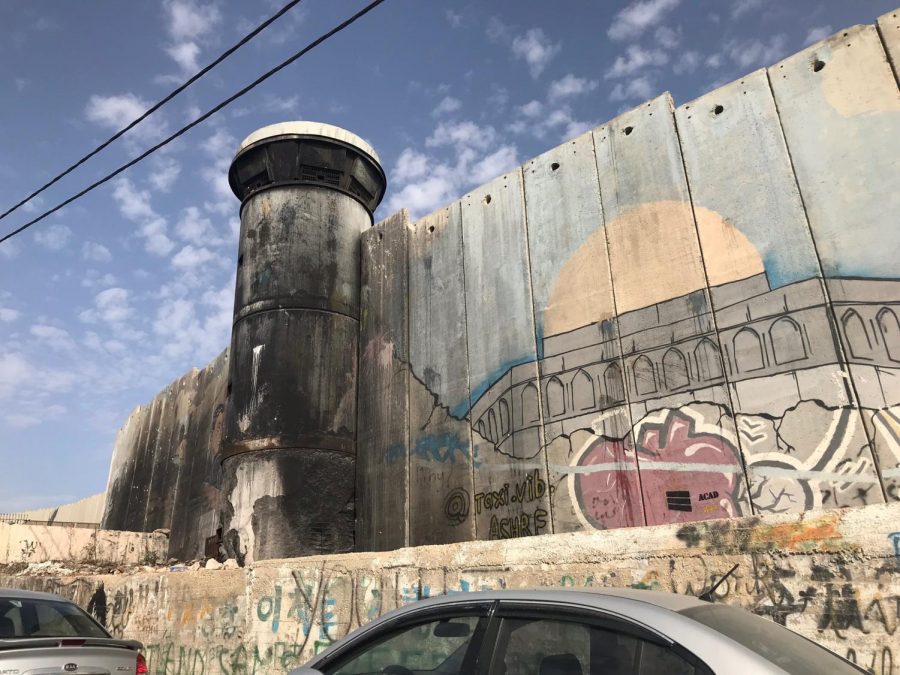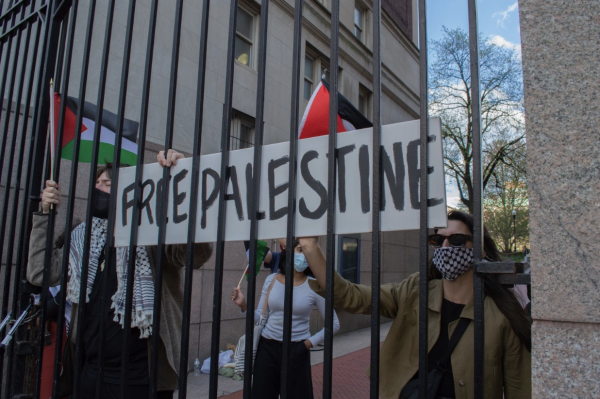Israel Must Withdraw From West Bank
By Jack McClatchy
Israeli soldiers shot a Palestinian teenager at a checkpoint last week. Israeli settlers shot and killed a Palestinian father of four in late January. A Palestinian shooter killed two Israelis and wounded two others at a bus stop in December after Israeli soldiers killed two Palestinians.
Violence in the Israeli-occupied West Bank is not new, but it has escalated in the past months. According to the United Nations Office for the Coordination of Humanitarian Affairs, 295 Palestinians died, and over 29,000 were injured in 2018, 105 of which were killed in the West Bank, whom comprises the territory of the historic British Mandate in Palestine on the west bank of the Jordan River.
Tensions have escalated since the recognition of Jerusalem as the capital of Israel by the United States. The status of Jerusalem, which is claimed as the capital of both Israel and Palestine, is a thorny issue to say the least, and President Trump’s recognition of Israeli control of Jerusalem set off a wave of unrest throughout the region.
Since Israel’s founding in 1948, it has been in conflict with the Arab world, fighting off coalitions of various Arab states in 1948, 1967 and 1973. After the 1967 war, Israel took control of the Gaza Strip and the West Bank.
Israel unilaterally annexed East Jerusalem and declared the entire city its capital, which largely went unrecognized until last year, as most countries have their embassies in Tel Aviv, which was the provisional capital of Israel before it moved to Jerusalem.
With the West Bank under Israeli control, settlers moved in and pushed out Palestinians that were previously living there. Over 500,000 settlers live in the West Bank, further complicating chances of a resolution to the conflict.
These settlements in the West Bank are illegal as declared by the U.N. Security Council, which asserts that any incursion made by Israel past the borders established after 1967 “had no legal validity, constituting a flagrant violation under international law and a major obstacle to the vision of two States living side-by-side in peace and security, within internationally recognized borders.”
The escalating violence in the West Bank in the past year, along with the incredibly deadly Great March of Return where Israeli soldiers killed over 214 Palestinian protesters, shows that something needs to be done to rootout the violence and death. Things cannot continue as they are now, or use more and more people will die senselessly.
The main challenger to take Prime Minister Benjamin Netanyahu’s job, former Chief-of-Staff of the Israeli Army Benny Gantz, breathed new life into discussions on the West Bank recently when he suggested that Israel take the lessons of the 2005 Gaza withdrawal and “enact them elsewhere.”
While he didn’t explicitly mention the West Bank, there aren’t many other places where Israel can apply what it learned in 2005 when it withdrew military forces and closed all settlements.
Gantz further clarified what he meant after he came under fire from right wing parties, saying that “a Gantz government will not take any unilateral steps related to the evacuation of communities.”
While Gantz said that there are no plans for withdrawing the settlements in the West Bank and reaffirmed that Israel would hold onto the Golan Heights and all of Jerusalem, Israel needs to withdraw from the West Bank to inspire confidence in peace negotiations.
Settlements are a main sticking point in negotiations and are used as evidence by Palestinian activists that Israel is a colonial project in the Middle East that seeks to establish an exclusively Jewish state. Removing the settlements will take a lot of wind off the sails for that argument, and allow affected Palestinian communities to start the healing process.
Withdrawing from the West Bank is going to be easy. If it was, it would have been done already. There are many things standing in the way of a withdrawal, from security concerns to lack of political will to vote on it in the Knesset.
If Israel continues to sponsor settlements in the West Bank, hopes of a two-state solution to the conflict, in which Israel is a Jewish state and Palestine an Arab one, will be harder and harder to achieve as Israel already controls over sixty percent of the West Bank and has systematically separated zones of Palestinian control according to Obama advisor Ben Rhodes.
At the end of the day, Israeli politicians can express a desire to end the conflict and to be secure in its borders, but Israel cannot seriously desire peace if it continues to support the settlements in the West Bank and assert control over East Jerusalem. It needs to reinstate the 1967 borders to show good faith in negotiations that have all but fallen apart.
If it doesn’t take these steps to restore peace, the conflict will only intensify as Palestinian militants seize on the hardline Netanyahu government and the incompetence of the Trump administration in finding peace while at the same time recognizing Jerusalem as the rightful capital of Israel.
As Israel continues to encroach on land that is rightfully Palestinian, resistance will continue. Palestine cannot be a functioning state if it is sliced up and constricted by patterns of Israeli settlement and discriminatory laws banning Palestinian economic development.
While not all actions taken by Palestinians are excusable, it is understandable that they would respond violently when all other options have been exhausted.
The only way to peacefully end this conflict is to return to internationally recognized borders. The suggestion by Gantz is the only way to begin to end this conflict, whether or not it is politically expedient.
Jack McClatchy, FCRH ’21, is a political science major from Wayne, Pennsylania.







